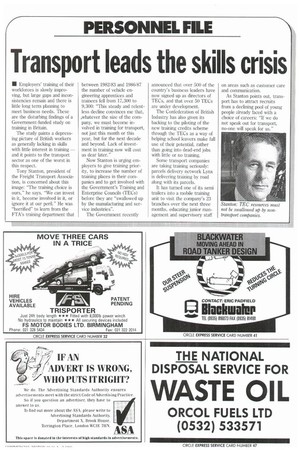Transport leads the skills crisis
Page 75

If you've noticed an error in this article please click here to report it so we can fix it.
• Employers' training of their workforces is slowly improving, but large gaps and inconsistencies remain and there is little long term planning to meet business needs. These are the disturbing findings of a Government-funded study on training in Britain.
'Ihe study paints a depressing picture of British workers as generally lacking in skills with little interest in training — and it points to the transport sector as one of the worst in this respect.
Tony Stanton, president of the Freight Transport Association, is concerned about this image: "The training choice is ours," he says. "We can invest in it, become involved in it, or ignore it at our peril." He was "horrified" to learn from the ETA's training department that
between 1982/83 and 1986/87 the number of vehicle engineering apprentices and trainees fell from 17,300 to 9,300: "This steady and relentless decline convinces me that, ,whatever the size of the company, we must become involved in training for transport, not just this month or this year, but for the next decade and beyond. Lack of investment in training now will cost us dear later."
Now Stanton is urging employers to give training priority, to increase the number of training places in their companies and to get involved with the Government's Training and Enterprise Councils (TECs) before they are "swallowed up by the -manufacturing and service industries".
The Government recently
announced that over 500 of the country's business leaders have now signed up as directors of TECs, and that over 50 TECs are under development.
The Confederation of British Industry has also given its backing to the piloting of the new training credits scheme through the TECs as a way of helping school leavers make full use of their potential, rather than going into dead-end jobs with little or no training.
Some transport companies are taking training seriously: parcels delivery network Lynx is delivering training by road along with its parcels.
It has turned one of its semi trailers into a mobile training unit to visit the company's 23 branches over the next three months, educating junior management and supervisory staff
on areas such as customer care and communication.
As Stanton points out, transport has to attract recruits from a declining pool of young people already faced with a choice of careers: "If we do not speak out for transport, no-one will speak for us."
























































































































































